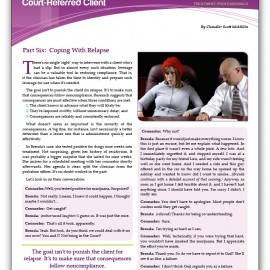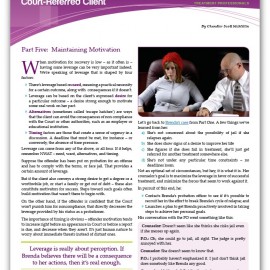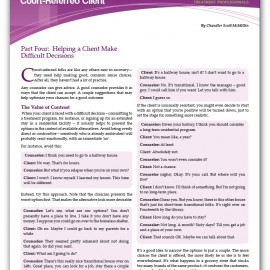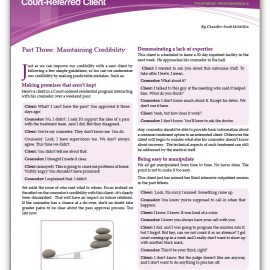Addiction Clinicians
Using Leverage in Counseling the Court-Referred Client, Part 6
A big fine, for instance, isn’t necessarily a better deterrent than a lesser one that is administered quickly and effectively.
Topics: client types and needs, compliance and noncompliance, counseling, court-mandated, criminal courts, DUI/DWI, establishing credibility, legal problems, leverage, relapse, Using Leverage Series
Using Leverage in Counseling the Court-Referred Client, Part 5
But if the client also conveys a strong desire to get a degree or a worthwhile job, or start a family or get out of debt – these also constitute motivators for success.
Topics: client engagement and motivation, compliance and noncompliance, court-mandated, DUI/DWI, leverage, Using Leverage Series
Will This Client Follow Directions?
If Bob gets a job, his mom will ask him to move out of the basement, and he’ll have to get a roommate, which he doesn’t want, so better to remain unemployed.
Topics: client engagement and motivation, compliance and noncompliance, counseling skills
Quick Onset: “One Drink” Alcoholism
One large survey of alcoholics found that some 14% had actually become dependent within a year of the first drink. The percentage almost doubled when the time period was extended to two years.
Topics: alcohol, alcoholism, disease, recognizing addiction, signs and symptoms
Trapped: Helping Clients Avoid Relapse
Would have been easy enough to avoid, had I seen it coming. Unfortunately the brain I was using to make decisions was the addicted one. It was not a friend to recovery.
Topics: addiction and the brain, craving, patient education, relapse, signs and symptoms, tobacco
Using Leverage in Counseling the Court-Referred Client, Part 4
It’s not just what you present to your client — it’s how you present it. By following a few simple rules, you get better results. It’s not a perfect system, by any means. But it should improve outcomes.
Topics: client engagement and motivation, client types and needs, counseling, counseling skills, court-mandated, criminal courts, DUI/DWI, legal problems, leverage, resistance manipulation ambivalence, Using Leverage Series
Alexithymia: What’s That Feeling?
It’s as if the addict is so accustomed to just acting on impulse that he/she has lost touch with the source of the impulse — ordinarily a negative emotional state such as anxiety, anger, sadness, etc.
Topics: communication, counseling skills, emotional issues, groups, signs and symptoms, therapies and tools
Using Leverage in Counseling the Court-Referred Client, Part 3
Clients will test boundaries just to see what will happen when they do. If you’re prepared for such tests, and can avoid some predictable errors in response, you’ll find that the course of treatment runs smoother.
Topics: client engagement and motivation, counseling skills, DUI/DWI, leverage, Using Leverage Series
Finding Evidence-Based Practices
Seeking evidence, and applying practices based on evidence to your clinical interventions, can help making decisions that increase the chances of a desired outcome
Topics: counseling skills, therapeutic models, therapies and tools
Rehab Soundbyte: Cookie Power
Call it a bribe, call it an incentive, call it a clever idea… Giving a reluctant client a reason to comply can help treatment along.
Topics: client engagement and motivation, counseling, counseling skills, Rehab Soundbytes


















